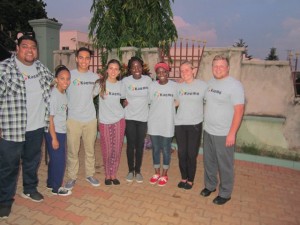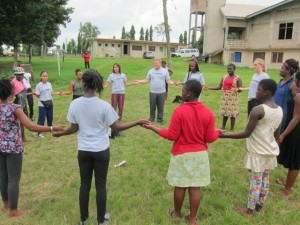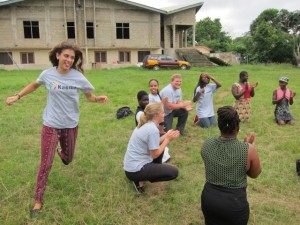This week’s blog post comes to us courtesy of Nicole Acheampong
Hello, Kaeme friends!
Being in Ghana again has been simultaneously exhilarating and soothing. I am Ghanaian-American, my parents having grown up here before emigrating to the U.S. for university and job opportunities. This trip marks my sixth time visiting my family’s home country. It also marks the first time I have done so without any of my immediate family accompanying me.
Kumasi is a special city. As the bus we took from Accra neared the “Garden City” of Ghana, my eyes were glued to the windows, taking in the laid-back nighttime bustle of the streets, the unique redness of the dirt on the ground, and the flash of something familiar in the faces of the passerby. I’d like to think I’m beginning to recognize the physical markers of an Ashanti face – I’d like to think I’m beginning to recognize myself in this city.
There is something slow and easy-going that filters Kumasi’s movements, even in seemingly hectic spaces. A few days after arriving, the team took a trip to one of the city’s main markets. It was crowded, it was loud, it was confusing to navigate – and yet, at the same time, where I might expect to find stress, I instead found energy. The market had life. The streets have life – brightly colored buildings line the roads; compact, wooden food stalls line the buildings; traders weave quickly and boldly through the traffic, shouting their wares; and the cars zoom and lurch and flow through it all.
That is what is exhilarating. What is soothing: the persistence of waiting. As a team, we wait. We wait to depart. We wait for Wi-Fi to arrive. We wait for the frequent, random electricity outages to stretch over the city, settle themselves, resolve themselves, and depart. Electricity once again arrives. Our water continues running. The lights flicker back on, and the fans resume their speedy circulation. And we realize that the waiting was fine. I’ve realized that these little dips in activity, these moments and minutes of waiting, contribute to a city pace that does not rush. In Kumasi, I am learning to take my time.
With Kaeme, we are learning to wait for the children to arrive, to settle, to open up. I am writing this post after our second day of profiling. These first two days have been spent at the Westphalian Children’s Village. The kids there are on the older side, the youngest among them around fifteen years old. Despite the relative proximity in age between the children and us interns, there were layers of shyness, nervousness, and slight language mismatches that had to be navigated when we first arrived. Developing an environment of comfort and trust is not a process that can be rushed. It takes time. It took time, but soon enough the children were excitedly explaining games they’d like to play to us, and soon enough we were all running, and soon enough we were all laughing, and soon enough we were all tired and extremely sweaty but also sitting together and still laughing, the children seeming much more relaxed and a bit more at ease with us than they had been when we first arrived.
There was still a long way to go – there was still some shyness and some nervousness on the part of the kids, and still a lot of adjusting and confusion on the part of us interns as we sat down to begin the nitty-gritty work of compiling profiles. My first role was as a transcriber, meaning I was one of the ones doing detetective work through the files that the orphanage had on hand for each child, searching through the documents and letters to find and write down the information needed for the Department of Social Welfare profile. It took a long time for the group of us to finish the first round of transcribing. It took time for us to find our place in the new environment, to create a rhythm for the work, to stretch to fill our roles and meet our challenges, to settle in, to proceed. It is still taking time. We are waiting to see what the next orphanage brings, and we are waiting to see what it is best for us to bring to the orphanage – which new rhythm we should fall into. We are learning, and waiting to learn more. We are learning to wait, and the waiting is fine.
Best, Nicole Acheampong



